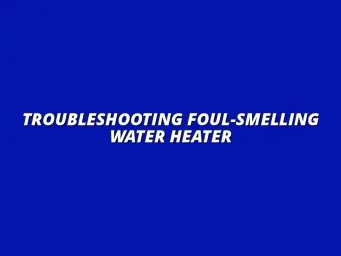
Troubleshooting Noisy Water Heaters
Understanding the Causes of Noise in Water Heaters
Water heaters are essential appliances in our homes, providing hot water for showers, cleaning, and cooking. However, they can sometimes be noisy, and understanding the causes behind these noises is crucial for maintaining the unit's efficiency. By recognizing different types of noises and their potential meanings, you can take the right steps to address any issues.
Often, homeowners may hear sounds that can be alarming, but not all noises indicate a serious problem. It's important to differentiate between normal operating sounds and those that signal a malfunction. Let's dive into the common types of noises you might encounter with your water heater. If you're experiencing persistent issues, you might find helpful information on common water heater issues explained.
Common Types of Noises from Water Heaters
Water heaters can produce a variety of sounds, and each one can hint at a different issue. Being aware of these sounds can help you identify when there's a problem that needs attention. Here are some of the most common types of noises:
- Banging or knocking: Often heard during heating cycles.
- Hissing or popping: Typically related to water and sediment issues.
- Rumbling or gurgling: Indicates potential overheating or mineral buildup.
Understanding these sounds is the first step in addressing the root cause. Two specific noises that are frequently reported are banging and knocking sounds, as well as hissing and popping noises.
Understanding Banging and Knocking Sounds
Banging or knocking sounds in your water heater can be quite disruptive. These noises usually occur when water vapor forms in trapped air pockets or when steam is produced beneath sediment layers. This buildup can lead to a sudden release of pressure, causing the loud banging sounds.
If left unaddressed, these noises can lead to more serious issues, including damage to the water heater itself. Regular maintenance and flushing can help minimize these sounds, ensuring your water heater runs smoothly. For more tips on efficient maintenance, check out this guide on how to maintain your water heater efficiently.
Recognizing Hissing and Popping Noises
Hissing and popping noises are often caused by water that is boiling as it comes into contact with hot surfaces or sediment. This occurs when minerals accumulate at the bottom of the tank, creating a barrier between the heating element and the water. The trapped steam can escape, causing the hissing sound.
These noises not only indicate potential sediment buildup but can also signify overheating. It’s essential to address these sounds quickly to prevent more severe damage to the heater.
Identifying the Root Causes of Water Heater Noise
Now that we have covered the common noises, let's explore the root causes behind them. Identifying the underlying issues can help you take proactive steps to prevent further damage. Here are some common causes of noise in water heaters:
- Mineral buildup: Accumulated minerals can lead to heat retention problems.
- Heating elements issues: Malfunctioning components can cause excessive noise.
- Water pressure and temperature settings: Improper settings can lead to additional stress on the system.
Understanding these root causes empowers you to take action. We’ll delve deeper into each of these issues to help you diagnose your water heater's noises effectively. If your water heater won't start, you can find solutions here: Fixing a Water Heater That Won't Start.
Mineral Buildup and Sediment Accumulation
One of the most common causes of noise in water heaters is mineral buildup, particularly from hard water. Over time, minerals like calcium and magnesium can settle at the bottom of the tank, leading to inefficiency and noise. This buildup not only affects your heater's performance but can also lead to premature failure if not addressed.
A regular maintenance routine, including flushing the tank, can help mitigate this issue. This simple step can significantly improve the lifespan and efficiency of your water heater.
Issues with Heating Elements and Components
Another potential cause of noise is related to the heating elements and other components of your water heater. If the heating elements are malfunctioning or if there are loose parts, you may hear unusual sounds. These issues require immediate attention, as they can lead to further damage and expensive repairs. Dealing with a leaky faucet? Find quick fixes here.
Impact of Water Pressure and Temperature Settings
Water pressure and temperature settings play a significant role in the noise your water heater may produce. High water pressure can stress the heater, leading to banging and knocking noises, while incorrect temperature settings can cause overheating and popping sounds. Monitoring and adjusting these settings can greatly reduce the chances of encountering unnecessary noise. Similarly, a leaky kitchen sink can create plumbing problems, learn how to repair a leaky kitchen sink.
Staying on top of these factors not only preserves the quality of your water heater but also enhances overall efficiency. Keeping your water heater quiet is possible with the right knowledge and maintenance practices!
Effective Solutions for Noisy Water Heaters
If your water heater is making disturbing noises, there are several effective solutions you can implement to bring back peace in your home. Many of these solutions are simple and can save you time and money. With a little effort, you can keep your water heater running smoothly and quietly!
Regular maintenance and timely repairs can significantly reduce noise levels. In this section, we will explore both maintenance tips and more involved repairs that may help you address persistent issues. Let's dive into some straightforward strategies. For quick ways to unblock a sink, check out this guide.
Simple Maintenance Tips to Reduce Noise
One of the best ways to keep your water heater quiet is through regular maintenance. By following a few easy steps, you can significantly reduce the noise levels coming from your heater. Here are some tips to keep in mind:
- Flushing Your Water Heater Regularly: Flushing helps to remove sediment buildup that can cause noise.
- Adjusting Temperature Settings Safely: Keeping the temperature at a moderate level can reduce the strain on the heating elements.
- Insulating Your Water Heater: Proper insulation helps prevent noises caused by temperature fluctuations.
- Checking for Leaks: Inspect around your water heater for any leaks that can contribute to noise.
By incorporating these simple maintenance tips, you can often reduce or eliminate the annoying sounds coming from your water heater. Regular checks can save you from bigger issues down the line!
Flushing Your Water Heater Regularly
Flushing your water heater should be done at least once a year, or more often if you live in an area with hard water. This process helps to eliminate sediment buildup that can lead to banging and popping noises. Here's how to do it:
- Turn off the power supply to the water heater.
- Connect a garden hose to the drain valve at the bottom of the tank.
- Open the drain valve and let water flow out until it runs clear.
- Close the valve, remove the hose, and refill the tank.
By taking these steps, you can maintain a clearer tank and reduce the chances of noise. Remember, a clean heater is a quiet heater!
Adjusting Temperature Settings Safely
Maintaining the right temperature on your water heater can help reduce noise and improve efficiency. The recommended temperature for most household water heaters is between 120°F and 140°F. Keeping it in this range can prevent overheating and related noises. For more extensive plumbing needs in Birmingham, consider contacting a plumber in Billesley, Birmingham.
To adjust the temperature:
- Locate the thermostat on your water heater.
- Use a flathead screwdriver to change the setting.
- Wait a few hours and check the water temperature.
By keeping an eye on your temperature settings, you can avoid unnecessary sounds while also ensuring a comfortable hot water supply!
Repair and Replacement Options for Persistent Issues
Sometimes, despite your best efforts at maintenance, a noisy water heater may still be an issue. In these cases, it may be necessary to consider repairs or even replacements. Let's take a look at some options you might have.
Understanding when to replace components can save you time and effort. Here are some indicators that suggest a component may need to be replaced:
- Frequent noises: If you notice persistent banging or popping sounds that don't improve with maintenance.
- Rusty water: This could indicate that the tank is corroding and may need replacement.
- Increased utility bills: This might suggest that your water heater is not functioning efficiently anymore.
It’s essential to weigh the cost of repairs against the potential benefits of installing a new unit. Sometimes, investing in a new water heater is the most cost-effective and long-term solution.
When to Replace Components of Your Water Heater
Knowing when to replace parts of your water heater can be tricky. Here are some common components that may need replacement:
- Heating elements: If they become damaged, they could cause unusual noises.
- Thermostats: Malfunctions can lead to erratic temperatures and associated sounds.
- Valves: Faulty pressure relief valves can create noise and be a safety hazard.
By keeping an eye on these components and replacing them when necessary, you can maintain a quieter environment!
Evaluating Cost-Effectiveness of Repairs vs. Replacement
When facing persistent issues with your water heater, evaluating the costs of repair versus replacement is crucial. Here’s a simple guide to help you make this decision:
- Repair Costs: If repairs are less than 50% of the cost of a new unit, then repairing is often the best option.
- Age of the Heater: If your water heater is over 10-15 years old, replacement is generally recommended.
- Warranty Status: Check if the repairs are covered under warranty.
By carefully considering these factors, you can ensure that you make the most informed decision regarding your water heater!
Addressing Common Questions and Concerns
As a homeowner, you might have some questions about noisy water heaters. It’s important to get reliable information so that you can take the right action. Let’s tackle some of the most common questions!
Understanding the answers to these questions can help alleviate concerns and guide you towards effective solutions. Let's explore them further.
Frequently Asked Questions about Noisy Water Heaters
Many homeowners face similar issues with their water heaters and often wonder about the noises they hear. Here are some frequently asked questions:
- What Are the Most Common Causes of Noise? Sediment buildup, malfunctioning components, and overheating can all lead to noise.
- Can Low Water Pressure Cause Noises? Yes, low water pressure can cause the heater to work harder, resulting in annoying sounds.
- Is a Noisy Water Heater Dangerous? While not always dangerous, it can indicate underlying issues that require attention.
By understanding these common questions, you can take proactive steps to address any issues with your water heater.
Final Thoughts on Maintaining a Quiet Water Heater
Maintaining a quiet water heater is not just about comfort; it can also save you money on repairs and energy bills. Regular inspections and maintenance are essential for keeping your heater in top shape. Let’s discuss a few key takeaways!
Here are a couple of important points to remember:
- Importance of Regular Inspections: Regular checks can help you catch issues before they escalate.
- Encouraging Proactive Steps: Don’t wait for a problem to arise; take action now to ensure your water heater runs smoothly.
With these tips, you can maintain a peaceful home environment and enjoy the benefits of a well-functioning water heater!




